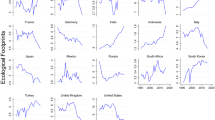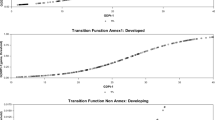Abstract
A great majority of the environmental Kuznets curve (EKC) literature use CO2 emissions to proxy for environmental degradation. However, this is an important shortage in application of the EKC concept because environmental degradation cannot be captured by CO2 emissions only. By using a broader proxy, ecological footprint, this study aims to investigate the presence of environmental Kuznets curve hypothesis for the EU countries. The annual data from 1980 to 2013 is examined with second generation panel data methodologies which take into account the cross-sectional dependence among countries. The results show that there is U-shaped relationship between the real income and ecological footprint. In addition, non-renewable energy increases the environmental degradation while renewable energy and trade openness decrease the environmental degradation in the EU countries. Policy implications are further discussed.
Similar content being viewed by others
References
Abid M (2017) Does economic, financial and institutional developments matter for environmental quality? A comparative analysis of EU and MEA countries. J Environ Manag 188:183–194. https://doi.org/10.1016/j.jenvman.2016.12.007
Acaravci A, Ozturk I (2010) On the relationship between energy consumption, CO2 emissions and economic growth in Europe. Energy 35(12):5412–5420. https://doi.org/10.1016/j.energy.2010.07.009
Ahmed A, Uddin GS, Sohag K (2016) Biomass energy, technological progress and the environmental Kuznets curve: evidence from selected European countries. Biomass Bioenergy 90:202–208. https://doi.org/10.1016/j.biombioe.2016.04.004
Al-Mulali U, Weng-Wai C, Sheau-Ting L, Mohammed AH (2015) Investigating the environmental Kuznets curve (EKC) hypothesis by utilizing the ecological footprint as an indicator of environmental degradation. Ecol Indic 48:315–323
Al-mulali U, Solarin SA, Sheau-Ting L, Ozturk I (2016a) Does moving towards renewable energy cause water and land inefficiency? An empirical investigation. Energy Policy 93:303–314. https://doi.org/10.1016/J.ENPOL.2016.03.023
Al-Mulali U, Ozturk I, Solarin SA (2016b) Investigating the environmental Kuznets curve hypothesis in seven regions: the role of renewable energy. Ecol Indic 67:267–282. https://doi.org/10.1016/j.ecolind.2016.02.059
Álvarez-Herránz A, Balsalobre D, Cantos JM, Shahbaz M (2018) Energy innovations-GHG emissions nexus: fresh empirical evidence from OECD countries. Energy Policy 101:90–100
Apergis N, Ozturk I (2015) Testing environmental Kuznets curve hypothesis in Asian countries. Ecol Indic 52:16–22. https://doi.org/10.1016/j.ecolind.2014.11.026
Arbulú I, Lozano J, Rey-Maquieira J (2015) Tourism and solid waste generation in Europe: a panel data assessment of the environmental Kuznets curve. Waste Manag 46:628–636. https://doi.org/10.1016/j.wasman.2015.04.014
Arrow K, Bolin B, Costanza R, Dasgupta P, Folke C, Holling CS et al (1995) Economic growth. Carrying Capacity, Environ:13–15. https://doi.org/10.2307/2269539
Aşıcı AA, Acar S (2016) Does income growth relocate ecological footprint? Ecol Indic 61:707–714
Aslan A, Destek MA, Okumus I (2018) Bootstrap rolling window estimation approach to analysis of the environment Kuznets curve hypothesis: evidence from the USA. Environ Sci Pollut Res 25(3):2402–2408
Bagliani M, Bravo G, Dalmazzone S (2008) A consumption-based approach to environmental Kuznets curves using the ecological footprint indicator. Ecol Econ 65(3):650–661
Baldwin, R. (1994). Does sustainability require growth? In I. GOLDIN & L. A. WINTERS (Eds.), The economics of sustainable development (first, pp. 51–78). Cambridge: Cambridge University Press
Balsalobre-Lorente D, Shahbaz M, Roubaud D, Farhani S (2018) How economic growth, renewable electricity and natural resources contribute to CO2 emissions? Energy Policy 113:356–367
Bartelmus, P. (2008). Quantitative eco-nomics: how sustainable are our economies? Quantitative eco-nomics: how sustainable are our economies? Springer Netherlands
Beckerman W (1992) Economic growth and the environment: whose growth? Whose environment? World Dev 20(4):481–496. https://doi.org/10.1016/0305-750X(92)90038-W
Bilgili F, Koçak E, Bulut Ü (2016) The dynamic impact of renewable energy consumption on CO2 emissions: a revisited environmental Kuznets curve approach. Renew Sust Energ Rev 54:838–845. https://doi.org/10.1016/j.rser.2015.10.080
Bölük G, Mert M (2014) Fossil & renewable energy consumption, GHGs (greenhouse gases) and economic growth: evidence from a panel of EU (European Union) countries. Energy 74:439–446. https://doi.org/10.1016/j.energy.2014.07.008
Borucke M, Moore D, Cranston G, Gracey K, Iha K, Larson J, Lazarus E, Morales JC, Wackernagel M, Galli A (2013) Accounting for demand and supply of the biosphere’s regenerative capacity: the National Footprint Accounts’ underlying methodology and framework. Ecol Indic 24:518–533
Breusch TS, Pagan AR (1980) The Lagrange multiplier test and its applications to model specification in econometrics. Rev Econ Stud 47(1):239–253
Caviglia-Harris JL, Chambers D, Kahn JR (2009) Taking the ‘U’ out of Kuznets. A comprehensive analysis of the EKC and environmental degradation. Ecol Econ 68(4):1149–1159
Charfeddine L, Mrabet Z (2017) The impact of economic development and social-political factors on ecological footprint: a panel data analysis for 15 MENA countries. Renew Sust Energ Rev 76:138–154. https://doi.org/10.1016/j.rser.2017.03.031
Chudik A, Pesaran MH (2015) Common correlated effects estimation of heterogeneous dynamic panel data models with weakly exogenous regressors. J Econ 188(2):393–420
Coondoo D, Dinda S (2008) Carbon dioxide emission and income: a temporal analysis of cross-country distributional patterns. Ecol Econ 65(2):375–385. https://doi.org/10.1016/j.ecolecon.2007.07.001
Costanza R (2000) The dynamics of the ecological footprint concept. Ecol Econ 32:341–345 Retrieved from www.elsevier.com/locate/ecolecon
Dinda S (2004) Environmental Kuznets curve hypothesis: a survey. Ecol Econ 49(4):431–455. https://doi.org/10.1016/j.ecolecon.2004.02.011
Dogan E, Seker F (2016) Determinants of CO2 emissions in the European Union: the role of renewable and non-renewable energy. Renew Energy 94:429–439. https://doi.org/10.1016/j.renene.2016.03.078
Donfouet, H. P. P., Jeanty, P. W., & Malin, E. (2013). A spatial dynamic panel analysis of the environmental Kuznets curve in European countries (no. WP 2013-18). Retrieved from http://crem.univ-rennes1.fr/wp/2013/201318.pdf
El Montasser G, Ajmi AN, Nguyen DK (2018) Carbon emissions- income relationships with structural breaks: the case of the Middle Eastern and North African countries. Environ Sci Pollut Res:1–10
EU (2018). Environment, https://europa.eu/european-union/topics/environment_en (date accessed 19.03.2018)
Fan Y, Liu L-C, Wu G, Wei Y-M (2006) Analyzing impact factors of CO2 emissions using the STIRPAT model. Environ Impact Assess Rev 26(4):377–395. https://doi.org/10.1016/j.eiar.2005.11.007
Grossman GM, Krueger AB (1991) Environmental impacts of a North American free trade agreement. National Bureau Economic Res Working Paper Series, No 3914(3914):1–57. https://doi.org/10.3386/w3914
Grossman GM, Krueger AB (1995) Economic growth and the environment. Q J Econ 110(2):353–377. https://doi.org/10.2307/2118443
Hao Y, Liu Y, Weng J-H, Gao Y (2016) Does the environmental Kuznets curve for coal consumption in China exist? New evidence from spatial econometric analysis. Energy 114:1214–1223. https://doi.org/10.1016/j.energy.2016.08.075
Hervieux M-S, Darné O (2015) Environmental Kuznets curve and ecological footprint: a time series analysis. Econ Bull 35(1):814–826
Holm S-O, Englund G (2009) Increased ecoefficiency and gross rebound effect: evidence from USA and six European countries 1960–2002. Ecol Econ 68(3):879–887. https://doi.org/10.1016/j.ecolecon.2008.07.006
Jordan, A.J. and C. Adelle (ed.) (2012) Environmental policy in the European Union: contexts, actors and policy dynamics (3e). Earthscan: London and Sterling, VA
Kao C (1999) Spurious regression and residual-based tests for cointegration in panel data. J Econom 90:1–44
Kasman A, Duman YS (2015) CO2 emissions, economic growth, energy consumption, trade and urbanization in new EU member and candidate countries: a panel data analysis. Econ Model 44:97–103. https://doi.org/10.1016/j.econmod.2014.10.022
Khan SAR, Zaman K, Zhang Y (2016) The relationship between energy-resource depletion, climate change, health resources and the environmental Kuznets curve: evidence from the panel of selected developed countries. Renew Sust Energ Rev 62:468–477. https://doi.org/10.1016/j.rser.2016.04.061
Kitzes J, Wackernagel M (2009) Answers to common questions in ecological footprint accounting. Ecol Indic 9(4):812–817
Lapinskienė G, Tvaronavičienė M, Vaitkus P (2014) Greenhouse gases emissions and economic growth – evidence substantiating the presence of environmental Kuznets curve in the EU. Technol Econ Dev Econ 20(1):65–78. https://doi.org/10.3846/20294913.2014.881434
Lee C-C, Chiu Y-B, Sun C-H (2010) The environmental Kuznets curve hypothesis for water pollution: do regions matter? Energy Policy 38(1):12–23. https://doi.org/10.1016/j.enpol.2009.05.004
Lin, D., Hanscom, L., Martindill, J., Borucke, M., Cohen, L., Galli, A., Lazarus, E., Zokai, G., Iha, K., Eaton, D., Wackernagel, M. (2016). Working guidebook to the National Footprint Accounts: 2016 Edition. Oakland: Global Footprint Network
López-Menéndez AJ, Pérez R, Moreno B (2014) Environmental costs and renewable energy: re-visiting the environmental Kuznets curve. J Environ Manag 145:368–373. https://doi.org/10.1016/j.jenvman.2014.07.017
Markandya A, Golub A, Pedroso-Galinato S (2006) Empirical analysis of National Income and SO2 emissions in selected European countries. Environ Resour Econ 35(3):221–257. https://doi.org/10.1007/s10640-006-9014-2
Marrero GA (2010) Greenhouse gases emissions, growth and the energy mix in Europe. Energy Econ 32(6):1356–1363. https://doi.org/10.1016/j.eneco.2010.09.007
Mazzanti M (2008) Is waste generation de-linking from economic growth? Empirical evidence for Europe. Appl Econ Lett 15(4):287–291. https://doi.org/10.1080/13504850500407640
Mazzanti M, Zoboli R (2009) Municipal waste Kuznets curves: evidence on socio-economic drivers and policy effectiveness from the EU. Environ Resour Econ 44(2):203–230. https://doi.org/10.1007/s10640-009-9280-x
McConnell KE (1997) Income and the demand for environmental quality. Environ Dev Econ 2(4):383–399
McDonald GW, Patterson MG (2004) Ecological footprints and interdependencies of New Zealand regions. Ecol Econ 50(1):49–67. https://doi.org/10.1016/j.ecolecon.2004.02.008
Menegaki AN, Tsagarakis KP (2015) Rich enough to go renewable, but too early to leave fossil energy? Renew Sust Energ Rev 41:1465–1477. https://doi.org/10.1016/j.rser.2014.09.038
Mrabet Z, Alsamara M (2017) Testing the Kuznets curve hypothesis for Qatar: a comparison between carbon dioxide and ecological footprint. Renew Sust Energ Rev 70:1366–1375. https://doi.org/10.1016/j.rser.2016.12.039
Ozturk I, Al-Mulali U, Saboori B (2016) Investigating the environmental Kuznets curve hypothesis: the role of tourism and ecological footprint. Environ Sci Pollut Res 23(2):1916–1928. https://doi.org/10.1007/s11356-015-5447-x
Pablo-Romero MP, Sánchez-Braza A (2017) Residential energy environmental Kuznets curve in the EU-28. Energy 125:44–54 Retrieved from http://www.sciencedirect.com/science/article/pii/S0360544217302736
Pablo-Romero MP, Cruz L, Barata E (2017) Testing the transport energy-environmental Kuznets curve hypothesis in the EU27 countries. Energy Econ 62:257–269. https://doi.org/10.1016/j.eneco.2017.01.003
Pedroni P (1999) Critical values for cointegration tests in heterogeneous panels with multiple regressors. Oxf Bull Econ Stat 61:653–670
Pedroni P (2000) Fully modified OLS for heterogeneous cointegrated panels. Adv Econ 15:93–130
Pedroni P (2001) Purchasing power parity tests in cointegrated panels. Rev Econ Stat 83:727–731
Pesaran, M. H. (2004). General diagnostic tests for cross section dependence in panels. CESifo working paper 1229. IZA discussion paper, 1240
Pesaran MH (2007) A simple panel unit root test in the presence of cross-section dependence. J Appl Econ 22(2):265–312
Pesaran MH, Ullah A, Yamagata T (2008) A bias-adjusted LM test of error cross-section independence. Econ J 11(1):105–127
Rafaj P, Amann M, Siri J, Wuester H (2014) Changes in European greenhouse gas and air pollutant emissions 1960–2010: decomposition of determining factors. Clim Chang 124(3):477–504. https://doi.org/10.1007/s10584-013-0826-0
Selden TM, Song D (1995) Neoclassical growth, the J curve for abatement, and the inverted U curve for pollution. J Environ Econ Manag 29(2):162–168. https://doi.org/10.1006/jeem.1995.1038
Selin H, VanDeveer S (2015) EU environmental policy making and implementation: changing processes and mixed outcomes, EUSA fourteenth biennial international conference, Boston. http://aei.pitt.edu/79664/1/Selin.VAnDeveer.pdf. Accessed 19 March 2018
Shahbaz M, Solarin SA, Hammoudeh S, Shahzad SJH (2017) Bounds testing approach to analyzing the environment Kuznets curve hypothesis with structural beaks: the role of biomass energy consumption in the United States. Energy Econ 68:548–565
Sinha A, Shahbaz M (2018) Estimation of environmental Kuznets curve for CO2 emission: role of renewable energy generation in India. Renew Energy 119:703–711
Stern, D. I. (2014). The Environmental Kuznets curve: a primer (CCEP working paper 1404)
Ulucak R, Bilgili F (2018) A reinvestigation of EKC model by ecological footprint measurement for high, middle and low income countries. J Clean Prod 188:144–157. https://doi.org/10.1016/j.jclepro.2018.03.191
Vehmas J, Luukkanen J, Kaivo-oja J (2007) Linking analyses and environmental Kuznets curves for aggregated material flows in the EU. J Clean Prod 15(17):1662–1673. https://doi.org/10.1016/j.jclepro.2006.08.010
Wackernagel M, Rees W (1996) Our ecological footprint: reducing human impact on the earth. New Society Publishers, The New Catalyst Bioregional Series
Wang Y, Kang L, Wu X, Xiao Y (2013) Estimating the environmental Kuznets curve for ecological footprint at the global level: a spatial econometric approach. Ecol Indic 34:15–21
Wang Y, Han R, Kubota J (2016) Is there an environmental Kuznets curve for SO2 emissions? A semi-parametric panel data analysis for China. Renew Sust Energ Rev 54:1182–1188. https://doi.org/10.1016/j.rser.2015.10.143
Westerlund J (2007) Testing for error correction in panel data. Oxf Bull Econ Stat 69:709–748
Author information
Authors and Affiliations
Corresponding author
Additional information
Responsible editor: Philippe Loubet
Rights and permissions
About this article
Cite this article
Destek, M.A., Ulucak, R. & Dogan, E. Analyzing the environmental Kuznets curve for the EU countries: the role of ecological footprint. Environ Sci Pollut Res 25, 29387–29396 (2018). https://doi.org/10.1007/s11356-018-2911-4
Received:
Accepted:
Published:
Issue Date:
DOI: https://doi.org/10.1007/s11356-018-2911-4




